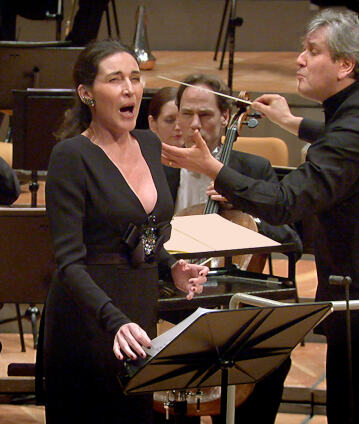Antonio Pappano and Véronique Gens

Sir Antonio Pappano, music director of London’s Royal Opera House and the Accademia Nazionale di Santa Cecilia in Rome, returns to the Berliner Philharmoniker after a 12-year absence. He presents a colourful programme that contrasts delicate French music by Ravel and Duparc with the brutal power of Russian works by Mussorgsky and Scriabin. The vocal soloist is Véronique Gens.
When asked how he composed, Maurice Ravel once replied, “Like a bricklayer building a wall! I write one note, then a second, and perhaps a third. Then I try to find out what will come of it...” Ravel’s trowel was the piano – without which, in his opinion, “no new harmonies could be invented”. The fact that he orchestrated a series of his compositions for this instrument at a later stage (and, in some cases, a considerable time after) shows that Ravel had to be fully convinced of the compositional structure of his work before he gave it the dazzling colours of a full orchestra. As a result of the care and mastery that he exercised in the field of instrumentation which made him one of the great sound magicians of the 20th century, the orchestral works that Ravel wrote based on his own piano pieces represent new artistic creations which are on a par with the respective piano versions. Sir Antonio Pappano, the conductor who holds the highest musical offices in London and Rome, has programmed two of the most ravishing examples of Ravel’s unorthodox working method for this Berliner Philharmoniker concert. Composed as part of a piano cycle, the movements Une barque sur l’océan and Alborada del gracioso were first performed by a pianist friend of Ravel before the composer later created splendid orchestral versions of them.
Henri Duparc, a fellow countryman from the generation of composers before Ravel, is remembered today almost exclusively for a setting of Baudelaire, published in 1872. However, during his lifetime, Duparc, who was also co-founder of the Société Nationale de Musique, was regarded as one of the most important representatives of French music. The programme gives the audience the opportunity to discover some of Duparc’s songs, including Invitation au voyage. They are sung by Véronique Gens, a soprano whose repertoire ranges from Monteverdi and Mozart to Berlioz and Poulenc, and who is also known for her performances of music by forgotten composers. The second part of the evening focuses on Russian music: the phantasmagoria that takes orchestral form in Modest Mussorgsky’s symphonic poem Night on Bald Mountain, plus the tonal orgies of Alexander Scriabin’s Poème de l’extase.
© 2018 Berlin Phil Media GmbH
Related interviews
Artists
Our recommendations
- Anniversary concert “50 years of the Berlin Philharmonie”
- Dalia Stasevska conducts Sibelius, Grieg, Saariaho and Debussy
- Nikolaus Harnoncourt conducts Brahms
- The Berlin Phil Series: Tango and more
- Zubin Mehta conducts Saint-Saëns’s “Organ Symphony”
- “Late Night” concert with Simon Rattle and a new masterpiece